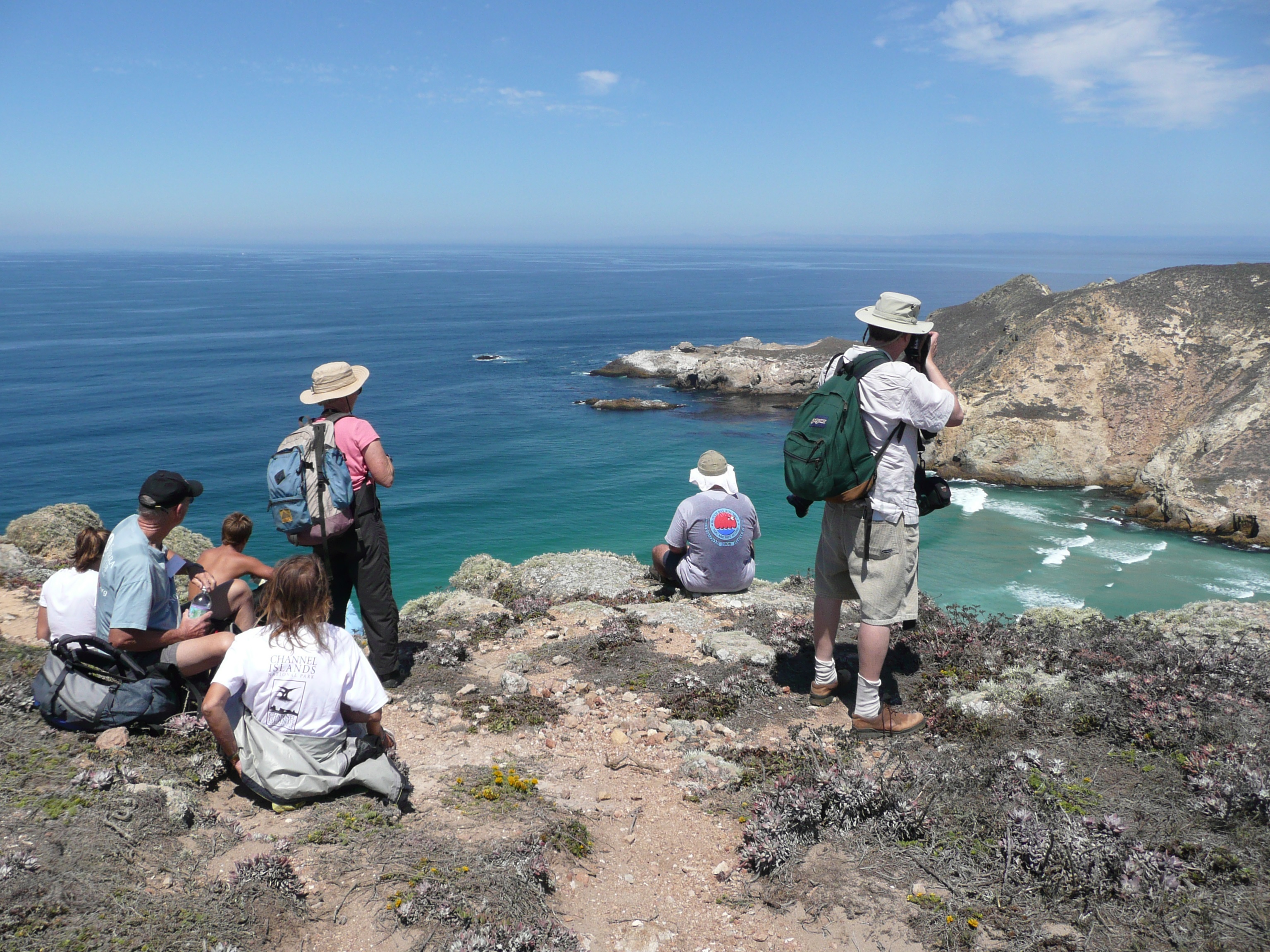
Club and Allies Win Big One for the Environment
CEC Moves Forward with Updated Water Use Efficiency Standards
Give a Unique Gift This Holiday Season: A Tour of Channel Islands National Park
New Internships with Sierra Club California

Club and Allies Win Big One for the Environment
By Kathryn Phillips
An effort begun by San Diego Chapter Sierra Club members, and then continued by Sierra Club California, to force the San Diego regional planning agency to reduce greenhouse gas emissions through better transportation planning cleared a big hurdle in late November.
Just days before Thanksgiving, the state appeals court affirmed and strengthened a lower court decision in favor of the Sierra Club and its allies.
Sierra Club was primarily represented by a team of attorneys at Shute, Mihaly, Weinberger, led by Rachel Hooper.
The decision by the Fourth District California Court of Appeal essentially told the San Diego Association of Governments (SANDAG) that it didn’t do the most basic work required to make sure the public and elected decision makers might reasonably know that the agency’s transportation plan would actually increase greenhouse gas emissions and certain ground-level pollution.
“By failing to adequately inform the public and decision makers the transportation plan is inconsistent with state climate policy, the EIR deterred the decision makers from devising and considering changes to favorably alter the trajectory of the transportation plan's post-2020 greenhouse gas emissions,” the majority of the three-judge panel wrote in its decision. “When the decision makers are inevitably faced with post-2020 requirements aligned with state climate policy, their task of complying with these requirements will be more difficult and some opportunities for compliance may be lost.”
The appeals court decision is the latest step in the Club’s effort to make sure the provisions of Senate Bill 375, which addresses planning to reduce greenhouse gas emissions, and other climate laws and orders are incorporated and followed around the state. The San Diego plan was the first to be completed under SB 375 which requires that regions produce plans to reduce climate disrupting emissions through their land use and transportation plans.
Even though the SANDAG plan showed that greenhouse gas emissions would increase between 2010 and 2050 from transportation as a result of the plan’s content, the SANDAG board, and then the California Air Resources Board, approved the plan in 2011. The SANDAG plan relies heavily on new road and freeway construction, with a limited nod to creating additional transit options in later years.
Shortly after those approvals, Sierra Club, via Sierra Club California, joined a lawsuit challenging the plan. The challenge, initiated by the Cleveland National Forest Foundation and the Center for Biological Diversity and based on California Environmental Quality Act (CEQA) provisions, contended that the agency’s plan didn’t adequately address or mitigate climate disrupting pollution. Additionally, the suit, joined also by Attorney General Kamala Harris, challenged the plan for not adequately addressing toxic air pollutants from transportation.
The majority opinion from the three-judge appeals court panel sided with the Club and its allies on all the major points we raised. This included a ruling that SANDAG failed to consider any alternative to its plan that focused on reducing the number of miles people must drive.
You can read the ruling here.
SANDAG has not indicated whether it intends to appeal the case to the California Supreme Court. However, concerns remain that the agency will attempt to undercut the latest decision by looking for a legislative “fix” to its resistance to creating a plan that will reduce greenhouse gas emissions and give San Diegans good transportation. Sierra Club California staff advocates are watching for any signs of such a play at the Capitol.
CEC Moves Forward with Updated Water Use Efficiency Standards
By Edward Moreno
Proposed standards to update the efficiency of toilets, urinals and faucets are moving toward completion as California tries to respond to the worst drought since recordkeeping began.
A first draft of new Title 20 (appliance efficiency standards) for toilets, urinals and faucets indicated the standards would save at least 8.2 billion gallons of water per year. At the same time, they would cut electricity consumption by 169 gigawatt hours, which would prevent the release of 1.9 million tons of climate pollution. About 20 percent of the electricity used in the state is for moving and treating water.
The California Energy Commission (CEC) is likely to release a final version of the proposed standards in early January. That release will be followed by a public hearing to provide an opportunity to comment on those proposed standards.
Plumbing manufacturers are expected to resist the new appliance standards. One industry leader recently published an opinion piece in a general circulation newspaper complaining that the expected standards are too stringent.
Sierra Club California staff and volunteers have been following the standards development. The Club endorses the reasonable phase-in of strong standards because they will save water and reduce energy consumption. We have expressed our support by submitting comment letters and attending previous workshops.
If you are interested in being involved in our efficiency work or in submitting your individual comment letter supporting appliance standards, be in touch with me at Edward.Moreno@sierraclub.org.
 Give a Unique Gift This Holiday Season: A Tour of Channel Islands National Park
Give a Unique Gift This Holiday Season: A Tour of Channel Islands National Park
You can’t wrap it up but it will be one of the best presents you give -- a tour of a precious area of our state not seen by many.
This spring and summer, you can experience the Channel Islands, including hiking and kayaking, with Sierra Club members and a park naturalist.
And it’s a gift that gives twice because your tour benefits the political work of Sierra Club California, the environment's strongest voice in the State Capitol. While you are floating about the islands, you will be helping to protect them and other natural resources found only in California.
Enticingly within view of Ventura and Santa Barbara, one of California’s (and the country’s) most unique environments is part of Channel Islands National Park and National Marine Sanctuary. It is also one of the least visited national parks in the U.S. The Channel Islands are only accessible by boat or plane.
2015 Trip Schedule:
March 28-30
April 5-7
May 3-5
June 14-16-- A Bird Lovers Special!
July 19-21
August 23-25
September 27-29
Please contact the trip leader, Joan Jones Holtz, for more information at jholtzhln@aol.com.
New Internships with Sierra Club California
A Sierra Club California internship provides an opportunity for undergraduates and graduate students to gain legislative advocacy experience, to work with the state’s most influential grassroots environmental organization, and to build a valuable foundation for future advocacy or legislative staff work. Our former interns now work in interesting jobs in the legislature, agencies, and environmental and other public interest organizations.
Sierra Club California seeks three interns this winter and spring to help with our state environmental advocacy programs in Sacramento:
The National Marine Sanctuary intern will help establish a new national marine sanctuary on the central coast. The intern will be based in Sacramento but some travel to the Central Coast may be required. The program includes grassroots organizing, media outreach, and helping the project’s lead organizer ensure campaign success.
The groundwater intern will attend legislative hearings and agency hearings and meetings, help with organizing Sierra Club volunteers and supporters, and assist in social media outreach to effectively implement the new California groundwater laws passed in August 2014.
The legislative intern will attend legislative hearings, help track bills, conduct issue research, help with correspondence on bill positions, and generally assist staff lobbyists to coordinate and activate volunteers on a range of environmental issues before the California legislature.
Remuneration can only involve non-monetary rewards such as personal satisfaction and valuable work experience in state/environmental politics. Students can often arrange for academic credit.
Beginning and ending dates of the internship are flexible, although we prefer interns to begin in early January and commit to working through a full legislative session (which ends in early September). We prefer interns to work a minimum of 10 hours per week.
Please send a cover letter and resume to Meg Johnson at meg.johnson@sierraclub.org.
Follow Us:
  |
Thank you for being a part of our work! You may securely donate online or by sending a check to Sierra Club California at 909 12th Street, Suite 202, Sacramento, CA 95814.